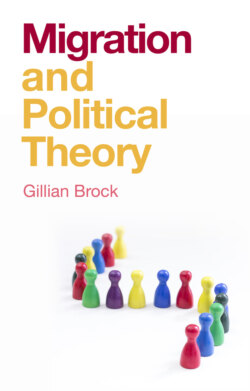Читать книгу Migration and Political Theory - Gillian Brock - Страница 15
2 The Right to Exclude and Open Borders
ОглавлениеMillions of people attempt to immigrate every year. And states are highly selective in deciding whom to include, denying membership to many. Would-be migrants frequently take extreme measures to enter anyhow, such as by paying people smugglers large sums of money to hide them in refrigerated containers or transport them in overcrowded boats, sometimes with tragic results. In a recent prominent case, in October 2019, 39 deceased Vietnamese were found in a sealed refrigerated van in Essex, United Kingdom, having begun their journey in distant lands and traveling through Europe.*
Most high-income states adopt very restrictive policies concerning admissions. One central question we examine in this chapter is: Should states be more generous in allowing would-be immigrants into their territory, so that they admit higher numbers than they currently do? We begin by focusing on the core questions that have dominated the literature: May states permissibly deny admission to any and all persons who would like to immigrate to their state, more or less as they see fit, and permissibly adopt a “closed borders” position should they so choose? By contrast, are they obliged to open their borders more than they currently do?
Those who argue in favor of more freedom of movement across borders often draw on two common lines of argument. One concerns massive injustice and inequality in the international sphere. Consider how people across the globe experience vast disparities in life prospects. Some states are incapable of providing even the most basic goods and services, such as clean water and safe sanitation, necessary for a decent life. Others seem to provide the essentials for a good life relatively reliably for almost all citizens. States vary greatly in the opportunities they can make available, including the opportunities for reasonably well-paid jobs, educational attainment, healthcare, and life expectancy. Those states that can offer such prospects are often thought to be desirable destinations and constitute considerable pull factors. And there are many relevant push factors as well that drive people to leave their countries of origin, searching for greener pastures. These include high levels of violence, dysfunctional or repressive governments, and civil war. So, because prospects for good lives are not evenly distributed across the world, this provides at least one dominant motivation for why some might seek to move.
This brings us to a second common consideration in favor of opening borders, which concerns human freedom and the right to free movement. Among the important values that we often think states should respect are people’s freedoms, especially their freedom of movement. If states restrict entry to their territory, are they violating an important freedom? Would they be violating a human right that people should enjoy?
Michael Walzer and Joseph Carens have been especially influential in debates on these issues of how open or closed our borders should be. They deserve a special focus, given that their arguments have largely set the terms for much contemporary debate, and as they offer opposing views, they will anchor the two central parts of this chapter.
Walzer starts from the idea that existing political communities can have important value. Self-determination, which is an essential part of sustaining a flourishing political community, therefore deserves special weight. His argument supports states’ rights to restrict immigration, though he also argues for important limits on such rights. Carens also allows for some permissible restrictions, such as when large numbers of entrants might threaten public order, safety or security, though it is also clear that Carens believes there are limits to arguments for restrictions on these grounds and, in general, borders should be far more open. In comparing these two positions, Walzer is arguing for relatively strong rights to control borders and to exclude. Carens, by contrast, argues for much weaker rights to control borders, and for us to take the interests of the global disadvantaged more seriously. Many who choose to leave their communities have very good reasons for wanting to exit, such as poverty, persecution, and oppression. Carens argues that we need to give those reasons more weight than we currently do in our admissions policies. While these two theorists ground the contrasting positions, we also consider the influential arguments of others who argue for similar conclusions but from very different perspectives.
